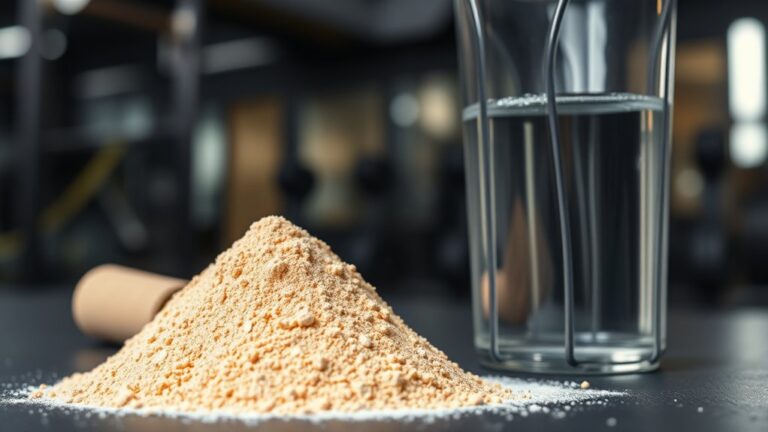The Truth About Protein Powders: Do You Really Need Them?

Protein powders can complement your diet but aren’t essential for everyone. Whole foods provide a balanced nutrient profile, helping you meet your protein needs effectively. While athletes and busy individuals might benefit from the convenience of protein powders, relying solely on them can lead to nutrient gaps. It’s important to choose wisely based on your dietary needs and preferences. Understanding the benefits and drawbacks can guide your decision on whether these supplements fit your lifestyle and goals.
Understanding Protein and Its Role in the Body
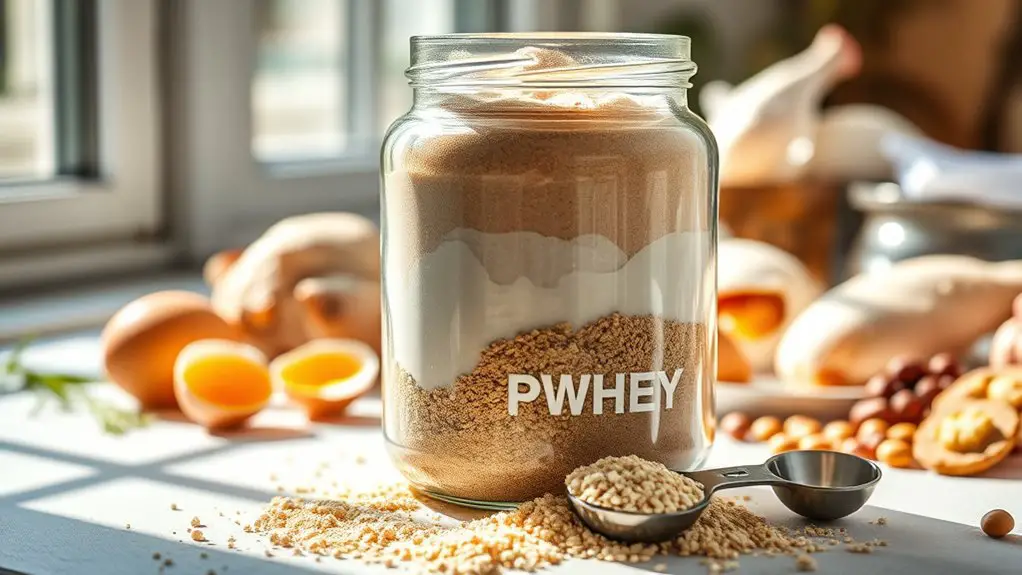
Protein is a fundamental macronutrient essential for your body’s growth, repair, and overall function. It plays a critical role in protein synthesis, which is the process where your body builds and repairs tissues. This process is crucial for muscle development, hormone production, and immune function. To support protein synthesis, it’s important to consume adequate dietary sources of protein. These sources can include animal products like meat, fish, eggs, and dairy, as well as plant-based options like beans, lentils, tofu, and nuts. Each of these foods provides different amino acids, the building blocks of proteins, that your body needs to function effectively. Ensuring a balanced intake from various sources will help you meet your protein needs and support your overall health. Understanding the role of protein can guide your dietary choices, whether you’re an athlete or just looking to maintain a healthy lifestyle.
Different Types of Protein Powders
When it comes to choosing a protein powder, you’ll find a variety of options available, each with distinct characteristics and benefits. Whey protein is popular for its fast absorption, making it ideal for post-workout recovery. Casein protein, on the other hand, digests slowly, providing a sustained release of amino acids. If you’re looking for plant-based alternatives, options like soy protein, pea protein, rice protein, and hemp protein cater to various dietary needs. Egg protein is another high-quality source, offering essential amino acids. Collagen protein supports skin and joint health, appealing to those focused on wellness. For those wanting a mix of benefits, protein blends combine different sources to provide a thorough amino acid profile. By understanding these types, you can make an informed choice that aligns with your nutritional goals and lifestyle.
Benefits of Protein Powders
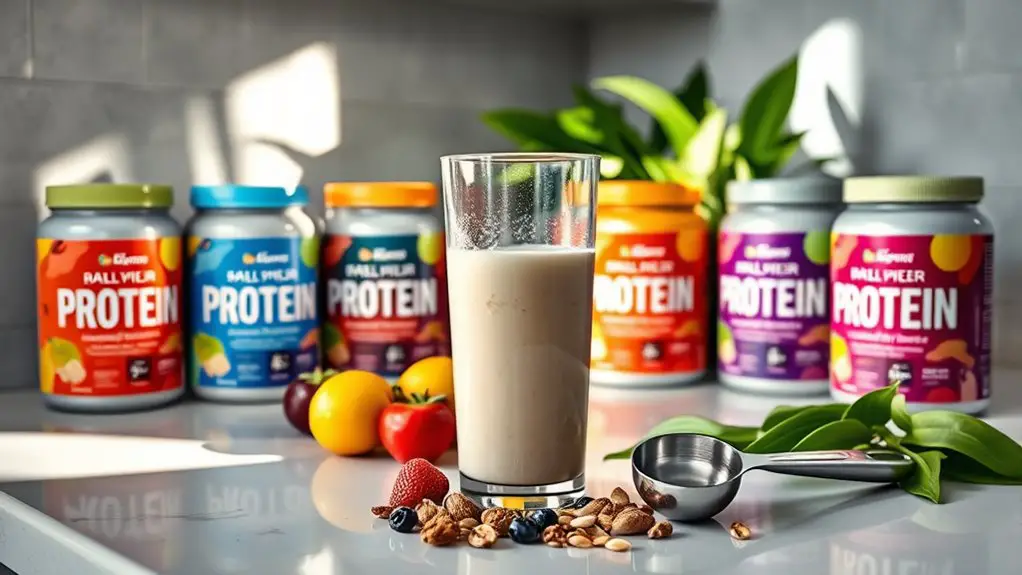
Protein powders can offer several benefits, particularly for those looking to support muscle recovery after workouts. They also provide a convenient source of nutrients, making it easier to meet your dietary needs on the go. Additionally, incorporating protein powders into your routine may aid in weight management by promoting satiety and preserving lean muscle mass.
Muscle Recovery Support
While intense workouts can lead to muscle fatigue and soreness, incorporating protein powders into your post-exercise routine may enhance recovery. Research shows that protein plays an essential role in muscle repair and growth, helping to decrease muscle soreness after workouts. By providing fundamental amino acids, protein powders can support your body’s recovery strategies, allowing you to bounce back quicker. Consuming protein shortly after exercise can stimulate muscle protein synthesis, which is critical for recovery. Additionally, studies indicate that athletes who include protein in their recovery regimen experience less soreness and improved performance in subsequent workouts. Overall, if you’re looking to optimize your recovery process, protein powders can be a beneficial addition to your routine.
Convenient Nutrient Source
For those with busy lifestyles, protein powders offer a practical solution to meet nutritional needs without the hassle of meal prep. They provide protein convenience, allowing you to easily incorporate essential nutrients into your diet, especially when you’re short on time. Whether you’re heading to work, the gym, or running errands, a quick shake can deliver a satisfying source of protein that supports your overall health and fitness goals. Many protein powders are formulated to be low in sugar and calories, making them a smart choice for on-the-go nutrition. By blending them with water or milk, you can create a nutritious drink in seconds, ensuring you stay energized and nourished throughout your day.
Weight Management Aid
Managing weight can be challenging, but protein powders may provide a helpful tool in your journey. Research suggests that increasing your protein intake can promote weight loss by enhancing satiety and reducing overall calorie consumption. When you incorporate protein powders into your diet, you can easily reach your daily protein goals, which is essential for maintaining muscle mass during weight loss. Additionally, protein-rich meals can help stabilize blood sugar levels, preventing spikes that lead to cravings. While protein powders should complement a balanced diet, they can be particularly useful for those with busy lifestyles or dietary restrictions. Remember, though, that they’re not a magic solution; the foundation of weight management lies in a well-rounded approach that includes nutrition and exercise.
Who Can Benefit From Protein Supplements?

If you’re an athlete or bodybuilder, protein supplements can help you meet your increased protein needs for muscle recovery and growth. Busy professionals and students may also find them convenient for fitting in essential nutrients during hectic schedules. Understanding your lifestyle and goals can help you determine if protein powders might be a beneficial addition to your diet.
Athletes and Bodybuilders
Many athletes and bodybuilders turn to protein supplements to enhance their performance and support muscle recovery. When you’re pushing your body through rigorous training regimens, your protein needs can increase considerably. Supplements can help you meet these elevated requirements, especially if you’re struggling to get enough protein through whole foods alone. Incorporating protein powders into your dietary strategies can simplify post-workout nutrition, ensuring your muscles receive the necessary amino acids for repair and growth. Research suggests that consuming protein shortly after exercise can optimize recovery. However, it’s vital to remember that supplements should complement a well-balanced diet, not replace whole food sources. Assess your individual needs and consult with a nutritionist to determine the best approach for your training goals.
Busy Professionals and Students
Protein supplements aren’t just for athletes and bodybuilders; they can also be incredibly beneficial for busy professionals and students. With tight schedules, you might struggle to meet your protein needs through whole foods alone. Incorporating protein powders can help you achieve dietary balance by providing a convenient source of protein when you’re on the go.
Additionally, protein timing can enhance muscle recovery and support overall energy levels, which is essential during long study sessions or demanding workdays. Research suggests that consuming protein throughout the day can optimize muscle protein synthesis, making it easier to maintain focus and stamina. So, if you’re juggling responsibilities, protein supplements might be a practical solution to help you stay nourished and energized.
Potential Drawbacks of Protein Powders
While protein powders can offer convenience and a quick source of protein, there are potential drawbacks that users should consider.
| Drawback | Description |
|---|---|
| Allergic Reactions | Some powders can trigger allergies, especially those containing dairy or soy. |
| Digestive Issues | Protein powders may cause bloating, gas, or discomfort in sensitive individuals. |
| Nutrient Imbalances | Relying solely on powders can lead to inadequate intake of essential nutrients. |
| Overconsumption Risks | Excessive protein intake may strain kidneys and lead to health issues. |
Additionally, many protein powders contain artificial additives, raising concerns about long-term health. Dependency concerns may arise if you rely too heavily on powders instead of whole foods. Finally, cost considerations and quality variations can make it challenging to choose a safe, effective product that fits your budget. It is crucial to weigh these factors carefully before including protein powders in your routine.
Whole Foods vs. Protein Powders: A Nutritional Comparison

When comparing whole foods to protein powders, it’s crucial to take into account factors like nutrient density, digestibility, and cost-effectiveness. Whole foods often provide a broader range of nutrients, while protein powders can offer concentrated protein intake. Understanding these differences can help you make informed choices about your dietary needs.
Nutrient Density Comparison
Understanding the differences in nutrient density between whole foods and protein powders is crucial for making informed dietary choices. Whole foods, like lean meats, beans, and dairy, offer a variety of nutrient sources, including vitamins, minerals, and fiber, which contribute to overall health. They also provide protein quality that supports muscle repair and growth. In contrast, protein powders often focus solely on protein content, lacking the same breadth of nutrients. While they can be convenient, relying solely on them may lead to nutrient gaps in your diet. Ultimately, incorporating a mix of whole foods guarantees you receive a well-rounded nutrition profile, whereas protein powders can serve as a supplement to your protein intake when needed.
Digestibility and Absorption
Digestibility and absorption rates can greatly influence your nutritional choices, especially when comparing whole foods to protein powders. Whole foods typically contain a variety of nutrients, including fiber and healthy fats, that can aid in digestion and enhance the effectiveness of digestive enzymes. This combination often leads to more gradual absorption rates, providing a steady release of amino acids. On the other hand, protein powders are processed and may be absorbed more quickly, which can be beneficial post-workout. However, this rapid absorption might not allow for the same level of nutrient synergy found in whole foods. Ultimately, your choice should consider not only protein content but also how well your body can digest and absorb these nutrients.
Cost-Effectiveness Analysis
How do the costs of whole foods compare to protein powders when it comes to nutrition? A cost analysis reveals that while protein powders can be convenient, whole foods often offer a more balanced nutritional profile at a comparable or lower price point. For example, a pound of chicken breast may provide around 100 grams of protein for a modest cost, while a protein powder may require more money for similar protein content, often lacking essential nutrients found in whole foods. Budget considerations also come into play, as purchasing whole foods can contribute to overall health, potentially reducing future healthcare costs. Ultimately, incorporating whole foods into your diet may yield better long-term value than relying solely on protein powders.
How to Choose the Right Protein Powder
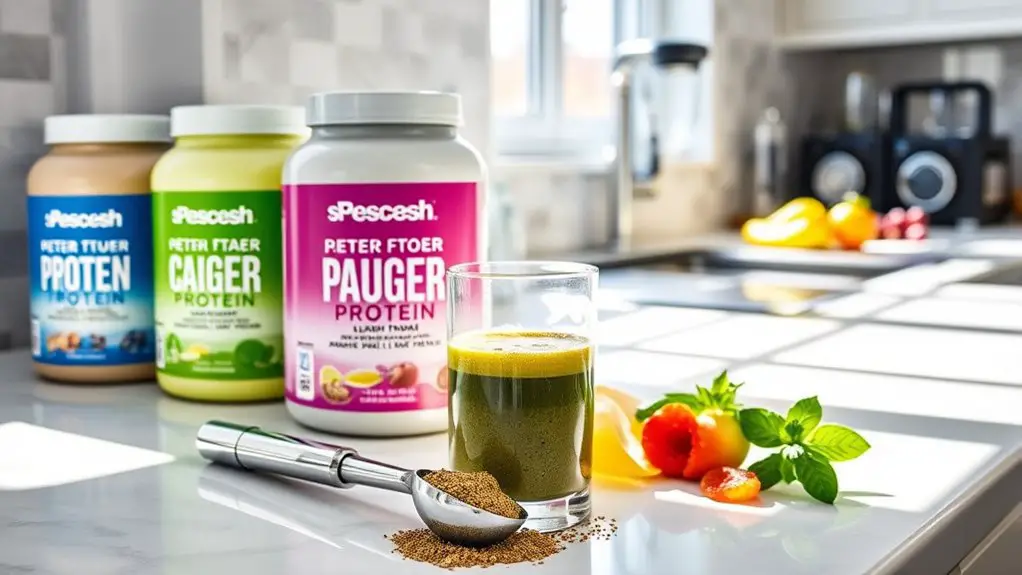
What factors should you consider when selecting a protein powder? First, assess your dietary restrictions and needs. If you’re vegan or lactose intolerant, look for plant-based options like pea or rice protein. Next, consider your flavor preferences, as some powders can taste chalky or artificial. Ingredient transparency is essential; choose brands that clearly list all components, avoiding those with excessive fillers or artificial additives.
Here’s a table to help guide your choice:
| Factor | Consideration | Recommendation |
|---|---|---|
| Dietary Restrictions | Vegan, gluten-free, dairy-free | Plant-based options |
| Flavor Preferences | Chocolate, vanilla, unflavored | Sample before committing |
| Ingredient Transparency | Clear labeling | Brands with minimal additives |
| Price | Budget-friendly vs. premium | Value per serving |
Timing and Dosage: When to Use Protein Powders
When’s the best time to incorporate protein powders into your routine? It really depends on your fitness goals and daily intake needs. Many find that using protein powders as pre workout shakes can enhance performance, providing your muscles with necessary fuel. Post workout timing is essential too; consuming protein soon after exercising can aid muscle recovery and growth.
Here are some dosage guidelines to take into account:
- Aim for 20-30 grams of protein per serving.
- Spread your protein intake throughout the day for ideal absorption.
- Take into account your total daily protein needs based on activity level.
- Adjust servings depending on workout intensity and duration.
Myths and Misconceptions About Protein Supplements
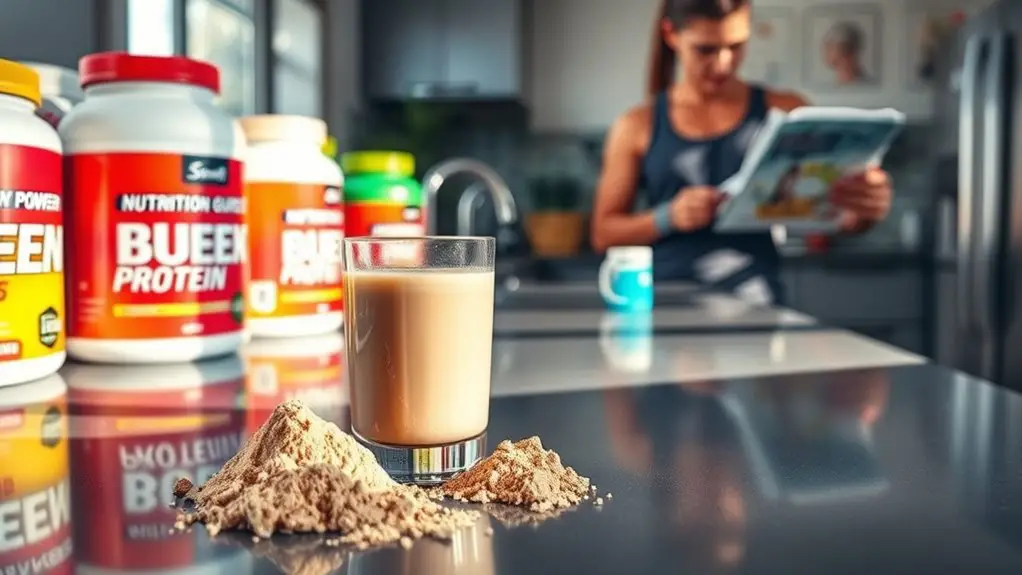
Have you ever wondered about the common myths surrounding protein supplements? Many people believe that protein powders are essential for building muscle or that they’re only for athletes. These protein myths can lead to unnecessary supplementation. In reality, most individuals can meet their protein needs through a balanced diet, which includes whole foods like meat, dairy, legumes, and nuts.
Another common misconception is that consuming excessive protein will automatically lead to more muscle gain. However, your body can only utilize a certain amount of protein at a time, and excess intake may simply be stored as fat.
Additionally, some think that all protein supplements are created equal. This isn’t true; quality and ingredients can vary widely. Understanding these supplement misconceptions helps you make informed choices about your nutrition. Always consider your individual needs and consult with a healthcare professional if you’re unsure about incorporating protein supplements into your routine.
Making an Informed Decision: Do You Need Protein Powders?
Are you truly getting enough protein in your diet, or could protein powders be a beneficial addition? To determine if protein powders are right for you, consider your unique protein needs, dietary preferences, and fitness goals. It’s important to evaluate your current protein sources and whether they’re sufficient for your lifestyle.
- Assess your daily protein intake and requirements based on activity level.
- Consider any health conditions that may affect protein absorption or needs.
- Weigh the potential benefits of supplementation against the risks, such as overconsumption or reliance on powders.
- Explore whole food alternatives that can meet your protein needs without supplementation.
Ultimately, the choice to use protein powders should be informed and tailored to your individual circumstances. Consulting with a healthcare professional can help you make the best decision for your health and fitness journey.
Frequently Asked Questions
Can Protein Powders Cause Digestive Issues for Some Individuals?
Yes, protein powders can cause digestive issues for some individuals. If you’ve experienced digestive discomfort after consuming them, it might be due to protein intolerance or sensitivity to specific ingredients, like lactose in whey protein. Many people report bloating or gas when using these supplements. It’s important to listen to your body; if you notice adverse effects, consider experimenting with different types of protein or consulting a healthcare professional for personalized advice.
Are There Age Restrictions for Using Protein Supplements?
While there’s no strict age limit for protein supplements, age guidelines suggest caution, especially for youth athletes. Studies show that around 30% of young athletes use these supplements, often without proper guidance. It’s essential to guarantee they meet their nutritional needs through whole foods first. If you’re considering protein supplements for younger individuals, consulting a healthcare professional or a registered dietitian is a smart move to avoid potential health risks.
Do Protein Powders Contain Any Allergens?
Yes, protein powders can contain allergens. If you’re sensitive to whey, be cautious, as whey protein is derived from milk and may trigger allergies for some individuals. Additionally, many plant-based protein powders contain soy, which can cause sensitivities in those allergic to soy products. Always check the ingredient label for potential allergens to verify you’re making a safe choice that aligns with your dietary needs and restrictions.
How Do Protein Powders Differ From Meal Replacement Shakes?
Imagine standing at a crossroads, each path leading to different nutritional benefits. Protein powders primarily focus on delivering concentrated protein, perfect for muscle recovery, while meal replacement shakes offer a balanced mix of protein, carbs, and fats to substitute a meal. Ingredient variations play an essential role; protein powders may contain fewer calories and added amino acids, whereas meal replacements usually include vitamins and minerals to guarantee you’re meeting broader dietary needs.
Can I Mix Protein Powder With Non-Dairy Milk Alternatives?
Yes, you can mix protein powder with non-dairy milk alternatives like almond, soy, or oat milk. These options not only enhance the flavor but also add nutritional benefits, such as additional vitamins and minerals. Depending on the milk you choose, you’ll find various flavor options that can complement your protein powder, making it more enjoyable. Just be certain to check the nutritional labels to confirm you’re meeting your dietary needs effectively.
